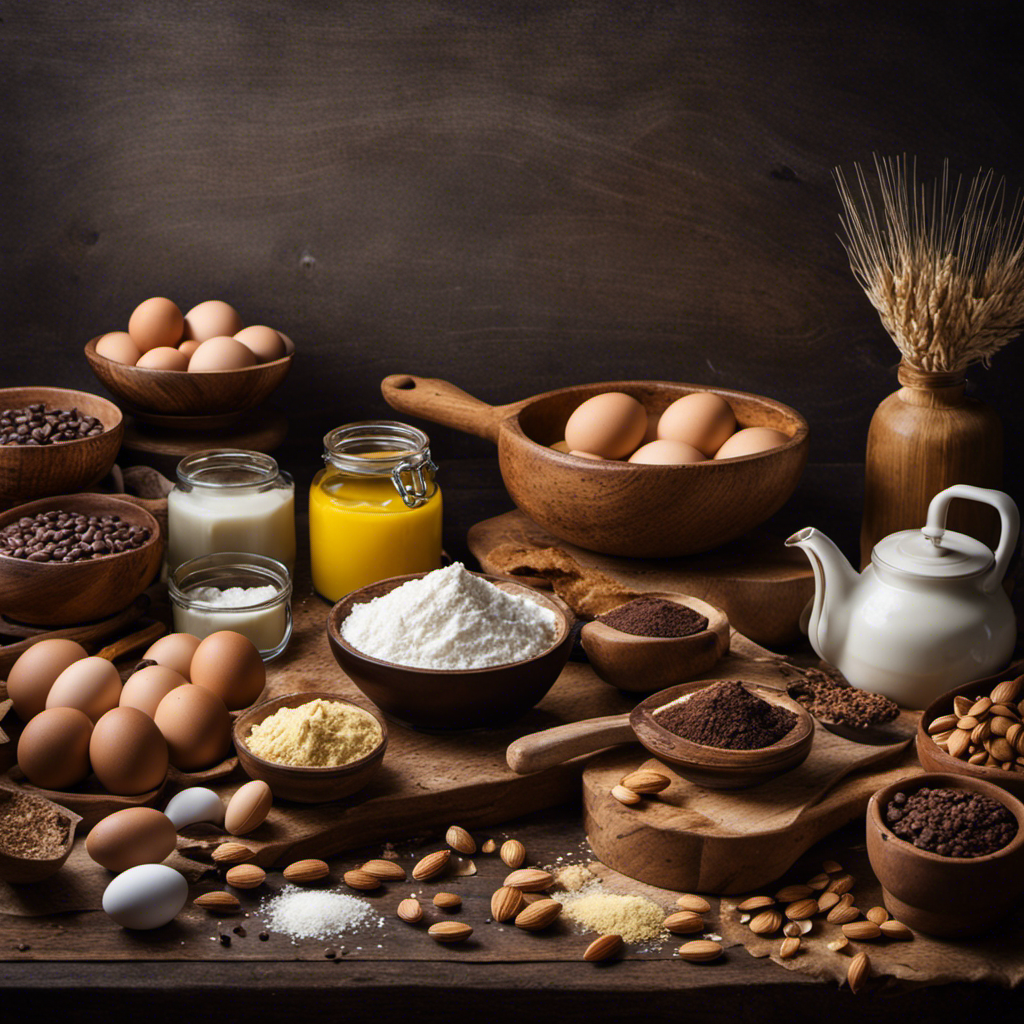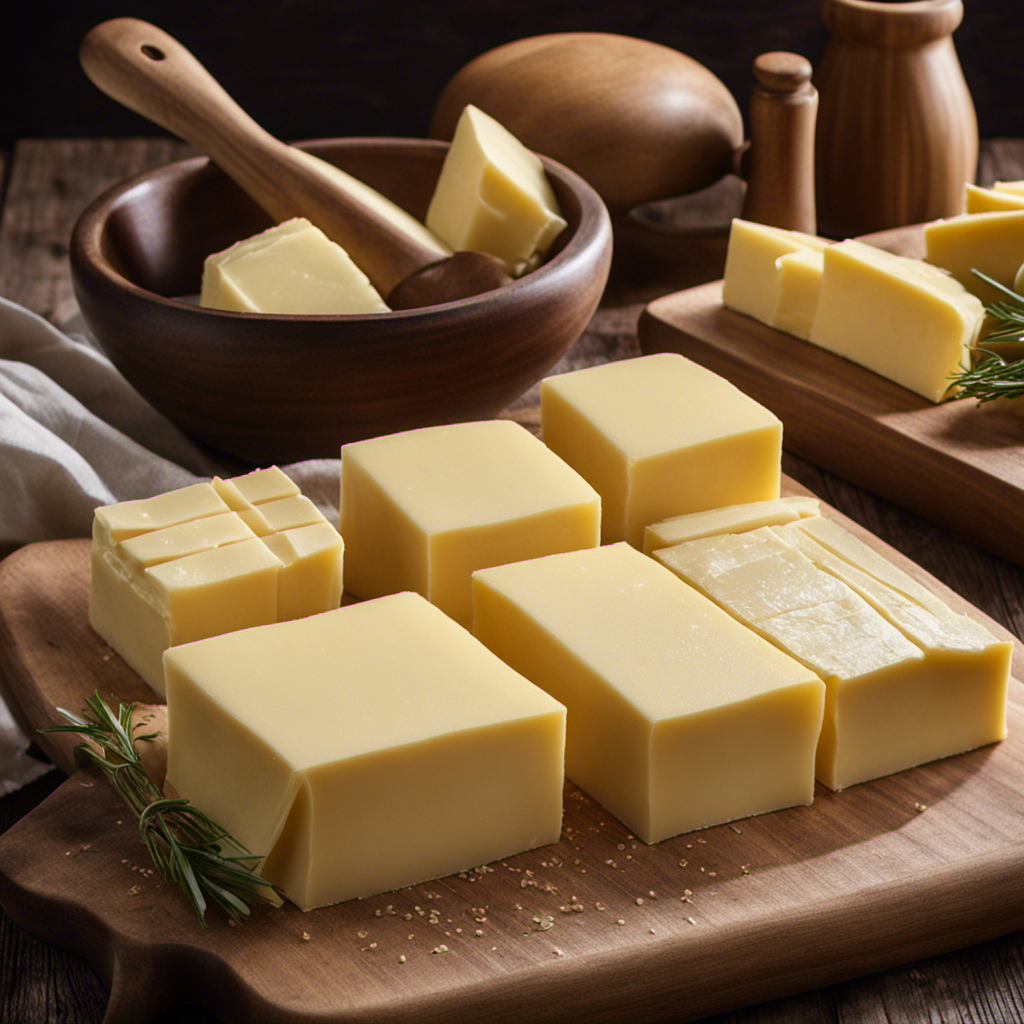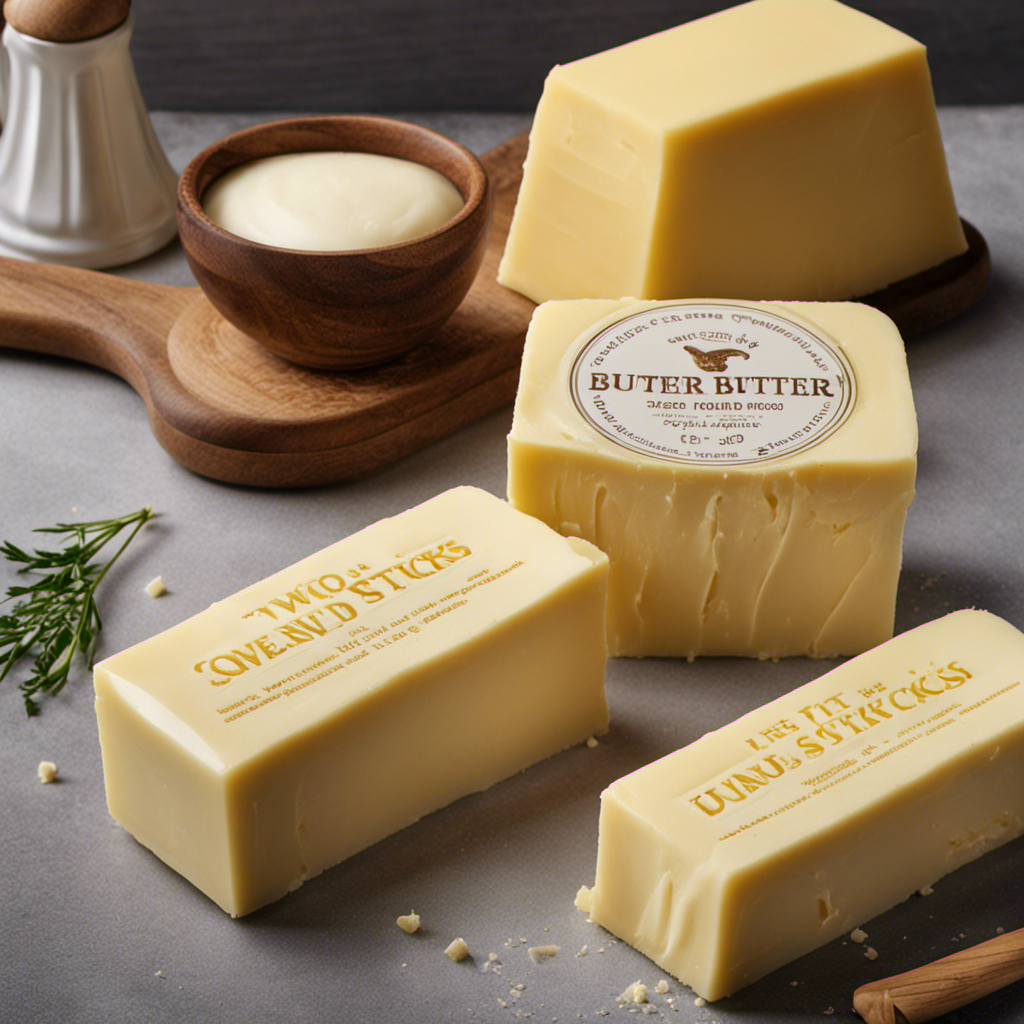Upon entering the kitchen, I am greeted by the inviting scent of freshly baked goods wafting through the air. Unfortunately, there seems to be an issue – I have run out of butter!
Yet, fear not, fellow baking enthusiasts, for I am here to share with you the secrets of creating delectable treats without a single pat of butter.
In this article, we will embark on a journey through the world of butter-free baking, exploring healthy alternatives, vegan substitutes, and even surprising options like avocados.
So grab your apron and let’s discover the wonders of what can be baked without butter!
Key Takeaways
- Baking without butter reduces saturated fat intake and is suitable for those with lactose intolerance or dairy allergies.
- Healthy alternatives to butter in baking include coconut oil, avocado spread, and applesauce, which contribute to a healthier lifestyle.
- Vegan baking can be achieved by using substitutes such as oil, applesauce, and nut butters, resulting in delicious dairy-free treats.
- Applesauce adds moisture and natural sweetness to baked goods, reducing the need for additional sugar and making them healthier and more delicious.
The Benefits of Baking Without Butter
Baking without butter has several benefits, such as reducing saturated fat intake. When it comes to healthy baking options, going dairy-free can be a game changer.
As someone who loves to bake, I was initially skeptical about the idea of baking without butter. However, I quickly discovered the numerous benefits of dairy-free baking.
Firstly, using alternative ingredients like coconut oil or avocado can add a unique flavor and richness to baked goods. Additionally, dairy-free baking is a great option for those with lactose intolerance or dairy allergies. It allows everyone to enjoy delicious treats without any discomfort.
Lastly, reducing saturated fat intake can contribute to a healthier lifestyle overall. With all these benefits in mind, it’s time to explore the various healthy alternatives to butter in baking.
Healthy Alternatives to Butter in Baking
One option for healthier baking is to use alternative spreads or oils instead of butter. When it comes to vegan baking or dairy-free baking, finding suitable substitutes for butter can be a challenge. Fortunately, there are plenty of options available that can provide the same richness and flavor without the use of dairy.
Here are three alternatives to butter that you can use in your baking:
| Alternative Spread/Oil | Flavor | Health Benefits |
|---|---|---|
| Coconut Oil | Rich, tropical taste | Contains healthy fats and can boost metabolism |
| Avocado Spread | Creamy, mild flavor | High in monounsaturated fats, vitamins, and minerals |
| Applesauce | Sweet, fruity flavor | Low in fat and calories, adds moisture to baked goods |
Experimenting with these alternatives can not only make your baking vegan and dairy-free, but it can also provide a healthier twist to your favorite recipes. So go ahead and give these alternatives a try in your next baking adventure!
Vegan Baking: Butter Substitutes to Try
When it comes to vegan baking, there are several alternatives to butter that can be used to achieve the same delicious results.
One option is to use oil as a substitute for butter. This not only adds moisture to your baked goods but also helps to create a tender texture.
Another option is to use applesauce. This not only adds moisture but also lends a natural sweetness to your treats.
And if you’re looking to add a burst of flavor, nut butters such as almond or peanut butter can be used as a substitute. They add richness and depth to your baked goods.
Oil as Butter Substitute
If you’re out of butter, you can use oil as a substitute in your baking. One oil substitute that works well is coconut oil. It adds a rich and tropical flavor to your baked goods. Coconut oil is solid at room temperature, so it can be easily creamed with sugar, just like butter. It also helps to keep your baked goods moist and tender. Here is a table showing the different types of oil substitutes and their properties:
| Oil Substitute | Flavor | Texture | Moisture |
|---|---|---|---|
| Coconut oil | Rich and tropical | Creamy and tender | Moist and flavorful |
| Olive oil | Savory and fruity | Moist and dense | Moist and rich |
| Avocado oil | Mild and buttery | Light and fluffy | Moist and silky |
Applesauce for Moistness
To add moistness to your baked goods, try using applesauce as an alternative ingredient. Substituting butter with applesauce not only reduces the overall fat content, but it also adds a subtle sweetness and a lovely texture to your creations. Here are a few benefits of using applesauce in baking:
-
Moisture: Applesauce helps to keep your baked goods moist and tender, making them more enjoyable to eat.
-
Healthier option: By replacing butter with applesauce, you can significantly reduce the amount of saturated fat in your recipes, making them a healthier choice.
-
Low in calories: Applesauce is lower in calories compared to butter, which can be beneficial for those watching their calorie intake.
-
Natural sweetness: Applesauce adds a natural sweetness to your baked goods, reducing the need for additional sugar.
So, if you’re looking for a way to make your baked treats healthier and more delicious, give applesauce a try.
Now, let’s move on to the next section and explore the use of nut butters for added flavor.
Nut Butters for Flavor
You can enhance the flavor of your baked goods by incorporating nut butters as an alternative ingredient. Nut butters, such as almond butter, peanut butter, and cashew butter, not only add a rich and creamy taste to your treats but also provide additional nutrients.
When using nut butter in baking, you can substitute it for butter or oil in equal amounts. This means that you can replace 1 cup of butter with 1 cup of nut butter to achieve a healthier and more flavorful result.
Nut butter recipes are versatile and can be used in a variety of baked goods, from cookies and brownies to cakes and muffins. So why not try adding some nutty goodness to your next baking adventure? Your taste buds will thank you!
Exploring Oil-Based Recipes for Butter-Free Baking
There are plenty of delicious oil-based recipes that you can try for butter-free baking. When it comes to baking without butter, using oil as a substitute not only provides a moist and tender texture, but also offers a range of benefits.
Here are some reasons why oil-based baking is a great option:
- Healthier Alternative: Oil contains less saturated fat than butter, making it a healthier choice for those watching their cholesterol levels.
- Moisture and Flavor: Oil helps to keep baked goods moist and tender, while also adding a subtle flavor to enhance the taste of your creations.
In addition to oil, another creative option for butter-free baking is using nut butters. Nut butters, such as almond or peanut butter, not only add a rich and nutty flavor to your baked goods, but also contribute to a softer texture. Try incorporating nut butters in cookies, brownies, or even as a filling for cakes.
The possibilities are endless when it comes to exploring oil-based recipes and incorporating nut butters into your baking adventures. So, get creative and enjoy the delicious results!
Baking Without Butter: Nut-Based Options
When it comes to dairy-free baking alternatives, one of the most flavorful options to explore is nut-based ingredients. Not only do they add a delightful nutty taste to your baked goods, but they also provide a rich texture and a boost of healthy fats.
From almond flour to cashew butter, these nutty flavors can elevate your baking creations to a whole new level of deliciousness.
Dairy-Free Baking Alternatives
If you’re looking to bake without butter, there are plenty of dairy-free alternatives to choose from. Whether you’re lactose intolerant or simply prefer to avoid dairy, these options will ensure you can still enjoy delicious baked goods.
Here are two dairy-free alternatives that are perfect for baking:
-
Dairy-Free Spreads: These spreads are made from plant-based oils and are a great substitute for butter in baking. They have a similar texture and can be used in equal amounts in most recipes. Look for spreads made from vegetable oils like soy, canola, or olive oil.
-
Baking with Coconut Oil: Coconut oil is a popular choice for dairy-free baking due to its rich flavor and creamy texture. It adds a subtle coconut taste to your baked goods and works well in recipes that call for melted butter. Simply replace the butter with an equal amount of melted coconut oil.
By using these dairy-free spreads and coconut oil, you can create delicious baked goods without compromising on taste or texture.
Now, let’s explore the next topic: nutty flavors in baking.
Nutty Flavors in Baking
One option for adding nutty flavors to your baked goods is to use almond flour as a substitute for regular flour. Almond flour is made from finely ground almonds, giving it a rich and nutty taste that adds depth to your recipes. Not only does almond flour enhance the flavor of your baked goods, but it also provides a moist and tender texture. To further enhance the nutty flavor, you can incorporate nut-based spreads such as almond butter or hazelnut spread into your recipes. These spreads not only add flavor but also contribute to the overall richness of your baked goods. Another way to infuse nutty flavors is by using coconut oil as a replacement for butter. Coconut oil has a subtle nutty taste that pairs well with baked goods, adding a tropical twist to your creations.
| Nutty Ingredients | Description | Benefits |
|---|---|---|
| Almond Flour | Finely ground almonds | Nutty taste, moist texture |
| Nut-based Spreads | Almond butter, hazelnut spread | Rich flavor, adds richness |
| Coconut Oil | Extracted from coconuts | Subtle nutty taste, tropical twist |
Baking With Applesauce: a Butter-Free Option
Using applesauce as a substitute for butter is a great way to bake without butter. Not only does it provide a healthier option, but it also adds a unique twist to your baked goods. Here are a few reasons why using applesauce in baking can be a game-changer:
-
Applesauce for sweetness:
-
Applesauce is naturally sweet, so it can be used to replace some of the sugar in your recipes. This not only reduces the overall sugar content but also adds a natural sweetness to your treats.
-
The natural sugars in applesauce caramelize during baking, enhancing the flavor profile of your baked goods, making them even more delicious.
-
Applesauce for texture:
-
Applesauce adds moisture to your recipes, making your baked goods moist and tender.
-
It also acts as a binding agent, similar to butter, ensuring that your baked goods hold together properly.
Yogurt and Sour Cream: Creamy Substitutes for Butter
Yogurt and sour cream are creamy substitutes for butter that can be used in baking. These delicious alternatives not only add moisture and richness to your baked goods but also offer some unique benefits.
Yogurt, for instance, is packed with probiotics that promote a healthy gut and boost your immune system. It also contains calcium, protein, and vitamins like B12 and D.
As for sour cream, it adds a tangy flavor and creamy texture to recipes. It can be used in cakes, cookies, and even breads.
When using yogurt or sour cream as a butter substitute, make sure to adjust the quantities accordingly and consider the impact on the overall flavor profile.
Baking With Avocado: a Surprising Butter Replacement
If you’re looking for a surprising butter replacement in your baking, consider using avocado for a healthier twist. Avocados are not only delicious and creamy, but they also offer numerous health benefits as a healthy fat.
Here are two reasons why you should give avocado a try in your sweet baked goods:
-
Rich and Creamy Texture: Avocado adds a velvety smoothness to your baked treats, making them moist and irresistible.
-
Nutrient Powerhouse: Avocado is packed with essential vitamins and minerals, including potassium, vitamin K, and vitamin E. Incorporating it into your baked goods adds a nutritious boost without sacrificing flavor.
Whether you’re making avocado brownies, avocado muffins, or avocado chocolate chip cookies, this unique ingredient will surprise and delight your taste buds. So go ahead, experiment with avocado in your next baking adventure and enjoy the goodness of this healthy fat in your sweet treats.
Experimenting With Margarine in Butter-Free Baking
When experimenting with margarine in your butter-free baking, you’ll discover a versatile ingredient that adds moisture and richness to your treats. Margarine, made from vegetable oils, is a popular alternative to butter for those seeking a dairy-free option. But how does it compare in taste? Let’s take a look at a quick taste comparison between margarine and butter:
| Margarine | Butter | |
|---|---|---|
| Creaminess | High | High |
| Richness | Medium | High |
| Flavor | Mild | Creamy |
| Saltiness | Varies | Varies |
As you can see, margarine offers a creamy and mild flavor, while butter provides a rich and creamy taste. It’s important to note that different brands of margarine may have varying levels of saltiness. To add a tropical twist to your baked goods, consider experimenting with coconut oil as a substitute for butter. Its subtle coconut flavor can enhance your treats and provide a unique taste experience. So go ahead, get creative in your butter-free baking adventures with margarine and coconut oil!
Frequently Asked Questions
Can I Use Margarine as a Substitute for Butter in Baking?
Margarine can be used as a substitute for butter in baking. It has a similar texture and flavor, but it is important to consider the health benefits. Margarine is often seen as a healthier alternative to butter in baking.
What Are Some Healthy Alternatives to Butter in Baking?
When it comes to baking without butter, there are plenty of healthy alternatives to choose from. You can try using different oils like coconut oil or olive oil, or explore vegan options like applesauce or mashed bananas. Get creative and experiment!
Are There Any Nut-Based Options for Baking Without Butter?
When it comes to vegan baking, there are plenty of nut-based options for replacing butter. From creamy almond butter to rich cashew cream, these oil substitutions add a delightful twist to your recipes.
Can Yogurt or Sour Cream Be Used as Creamy Substitutes for Butter in Baking?
Yogurt and sour cream can both be used as creamy substitutes for butter in baking. They add moisture and a tangy flavor to your baked goods. Fats play an important role in baking, providing texture and richness.
Can Avocado Be Used as a Surprising Replacement for Butter in Baking?
Avocado can be a surprising replacement for butter in baking. Avocado oil can be used as a substitute, while avocado butter can add a creamy texture. The avocado’s natural fats can enhance the flavor and moistness of baked goods.
Conclusion
In conclusion, baking without butter opens up a world of possibilities and benefits.
From healthier alternatives like nut-based options, applesauce, and yogurt to surprising substitutes like avocado and margarine, there are endless options for creating delicious baked goods without sacrificing taste or texture.
So why not step out of your buttery comfort zone and explore the realm of butter-free baking?
Your taste buds will thank you for the euphoric journey of flavors and textures that await!









